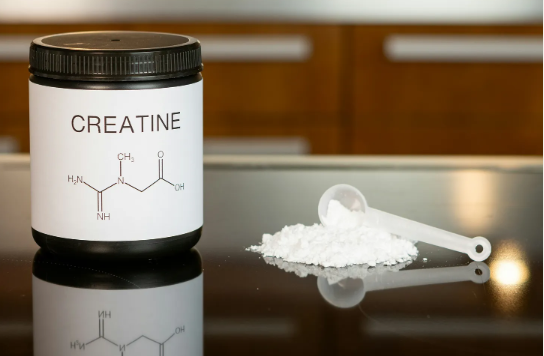Monthly Mythbust: Is Creatine Good for Women?
I’ve been on a TON of podcasts lately discussing which supplements women should consider taking, and I was recently quoted in a Stanford Lifestyle Medicine piece on supplements for women over 40. While I don’t believe anyone needs to take supplements—they should be add-ons after your diet is dialed in—creatine is an interesting one, especially for women. Here’s why.
What is creatine?
Creatine is an amino acid compound made up of arginine, glycine, and methionine. Your body naturally produces creatine in the liver, kidneys, and pancreas, and it’s primarily stored in your muscles, where it helps produce energy during high-intensity activities.
Creatine works by replenishing phosphocreatine (PCr), which is the primary energy source for short bursts of intense activity, like sprinting or weightlifting.
When your muscles use energy, they break down ATP (the energy currency of the body) into ADP (a lower-energy form). Phosphocreatine quickly donates a phosphate group to ADP, turning it back into ATP, allowing your muscles to keep working at high intensity.
What are the benefits of creatine for women?
Women naturally have less creatine in their bodies than men (with women exhibiting 70–80% lower endogenous creatine stores compared to men), and we also know that creatine concentrations decline with age, which can impact muscle mass, strength, and cognitive function. That’s where creatine supplementation can make a big difference—by helping to restore and maintain healthy creatine levels, especially as we get older.
By supplementing creatine, you increase your PCr stores, so your body can make more ATP during those short bursts of effort. By enhancing ATP regeneration, creatine allows women to push themselves a little harder during exercise, promoting more robust muscle mass and bone strength, which we know decline with age.
And we are learning that creatine’s benefits extend beyond just muscle. Your brain, which uses a large amount of energy for mental tasks, also relies on creatine. The brain's energy demand is high, especially during periods of mental effort like concentration or memory tasks.
Similar to muscles, the brain relies on ATP for energy, and when ATP levels drop, cognitive performance can decline. Creatine helps by boosting the brain's phosphocreatine stores, providing a quick mental energy source for when you need it most.
Studies have shown that creatine can improve brain function in tasks that require short-term memory and reasoning, making it a useful supplement for mental performance. There is even emerging data that creatine can be helpful after traumatic brain injury and one study recently showed that a large dose after a night of sleep deprivation can improve cognitive performance.
Let’s bust some myths about creatine:
Myth 1: Muscle is the only organ that uses creatine.
Many people think creatine is only useful for muscle building. While it’s true that creatine plays a key role in muscle function and recovery, it’s not limited to muscle tissue. Your brain uses a significant amount of creatine for energy, too. In fact, creatine supplementation has been shown to support cognitive function, including memory and focus, which is why it’s beneficial for both physical and mental performance.
Myth 2: Creatine makes women’s muscles bulky.
You may equate creatine with the gym-bro’s benching a bajillion pounds to get huge, but creatine won’t make women’s muscles bulky (unless that’s what you’re training for in the gym). It will help support muscle growth and strength, but it doesn’t lead to excessive muscle size. It’s a great option for women looking to enhance performance and build muscle at a healthy, sustainable rate. Whether you’re an athlete, a weekend warrior, or someone looking to stay healthy and active, creatine can benefit anyone looking to improve strength, recovery, and overall performance.
Myth 3: Creatine causes bloating.
One of the most common misconceptions about creatine is that it causes bloating. The reason people feel bloated when they first start taking creatine is due to the way it draws water into the muscles (and sometimes the gut). Creatine does help store more water in muscle tissue, which can lead to temporary water weight gain, especially during the first week or so of supplementation. This is often referred to as “water retention” and is completely normal. However, it’s important to note that this is not fat gain, and the water weight tends to stabilize after the initial few weeks of supplementation.
Myth 4: Creatine monohydrate is the only effective form.
Creatine monohydrate is often considered the gold standard, but creatine hydrochloride (HCl) is the form that’s gaining popularity. Creatine HCl is marketed as being more easily absorbed and causing less bloating. However, while it may have some benefits, the early research shows that creatine HCl and creatine monohydrate both deliver comparable performance gains. The key takeaway is that while both forms can be effective, monohydrate still remains the most studied and trusted (and affordable) option.
Myth 5: Creatine powder is better than creatine gummies (or vice versa).
When it comes to creatine, dose matters more than the format. For effectiveness, the recommended dosage of creatine monohydrate is typically 5 grams per day, whether in powder or gummy form. And, the great part is you can take it any time during the day, as long as you are consistent. However, buyer beware: a recent investigation on creatine gummies found that some brands contain less creatine than promised, which could limit their effectiveness. So, do your homework. Gummies are convenient, but it’s essential to ensure you’re getting the full dose. As for sugar in gummies, the added sugar content is generally minimal and isn’t a major concern for most people, as long as it’s part of an active lifestyle.
What’s the bottom line on creatine?
As I said earlier, I don’t believe anyone needs to take supplements, but creatine is a safe, effective, and underutilized supplement for women, and I take it daily. Whether you're looking to improve strength, cognitive function, or even sleep quality, I truly believe the data show that creatine can help.


